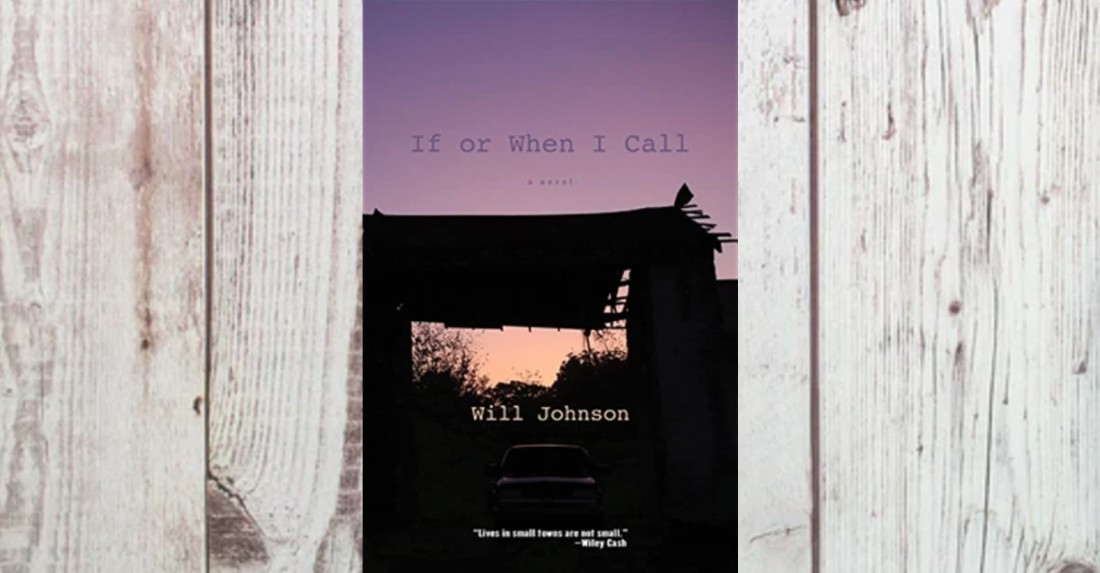Readers of Southern literary fiction are accustomed to stories about the hardscrabble lives of the working poor, people who are born into and never quite escape from the hand-to-mouth existence of the rural South. These aren’t always uplifting stories, by any means, as people bounce through their lives from one calamity to the next with little hope for deliverance.
This is the world inhabited by the characters in Will Johnson’s debut novel, If or When I Call, set in a small Missouri town. The gritty narrative begins when Parker, whose family has lived in the town for four generations, lands in a local tavern one night with some of his buddies and meets Melinda, the new bartender, recently arrived. Looking back on that night some seventeen years later, Parker remembers exactly what she looked like: “She wore faded jeans and a green and black flannel shirt. Red T-shirt underneath, and I remember she had on dark brown, worn-in work boots. Long and straight brown hair.” Parker and Melinda hit it off, fall in love — or maybe they’re in love from the beginning, given their verbal sparring that first night — marry, and produce a son, Ben.
Now, Ben is a teenager. Melinda and Parker have split up and Melinda has taken Ben to live with her sister Maureen in another small town nearby. While Parker has a steady job — at the moment — he hasn’t always been so reliable, and to make matters worse, he has a history of struggling with alcohol addiction, another familiar Southern literary trope. These challenges put stress on the marriage, of course, but the real problem seems to be Melinda’s inability to cope with Parker’s “fits,” unexplained seizures that have been plaguing him for the last few years.
The fits cause bizarre behavior and blackouts, and it isn’t clear that Melinda believes they’re even real, just as no doctor — when Parker can afford to see a doctor — can come up with a solid diagnosis. At one point, Parker is talking to a mechanic about some expensive car repairs when he suddenly goes off: “No YOU got that I got nothin’ . . . I said YOU got the air filters, me I got old pants see my old pants? . . . Old, old pants! You cannibal boy? . . . Ima get away from the cannibal boy! Get away away!” When Parker regains consciousness, he’s sitting on the curb and he understands why the mechanic and others are staying some distance from him: “Like a zoo animal or a rabid dog they were afraid to come near.”
Ben visits Parker periodically, but Parker is worried that his son will witness one of his fits, which further stresses their relationship. At the same time, Melinda is concerned that she is imposing on her sister’s goodwill, and also that Ben, who has to sleep on the couch in his aunt’s house, deserves better. Melinda is also troubled by her own paralysis, another symptom of the rural South: What is she doing with her life?
Complicating matters is that both Melinda and Parker are seeing other people, but not because they really want to, it seems. Melinda is dating Chad, a veteran of the Afghanistan conflict who may be suffering from PTSD and is violent and controlling, of both Melinda and Ben. Parker is seeing Rachel, a woman he met in his AA meetings, who is similarly possessive, and resentful when Parker wants to spend time with his son, not an omen of a particularly healthy relationship.
The novel begins to build to a climax when Melinda, encouraged by her ever-generous sister who feels some guilt for her past mistreatment of Melinda, goes on a solo road trip that is, not surprisingly, fraught with danger. Meanwhile, Parker plans to surprise Ben with a truck that he’s been wanting now that he’s old enough to drive, which is part of what contributes to a crisis that embroils them all.
These aren’t bad people, but as with other examples of the genre, we get the impression that their destiny is against them. Despite a sliver of hope in their story, they are unlikely to break out of their small lives. Even Ben, now equipped with wheels and a means of escape, has no dreams that would carry him away, and no place to go.
Told in chapters that rotate among the four principal characters, If or When I Call is a solid debut novel, beautifully written, about flawed people you’re sure to care about.
FICTION
If or When I Call
By Will Johnson
Goliad Media
Published March 15, 2021


